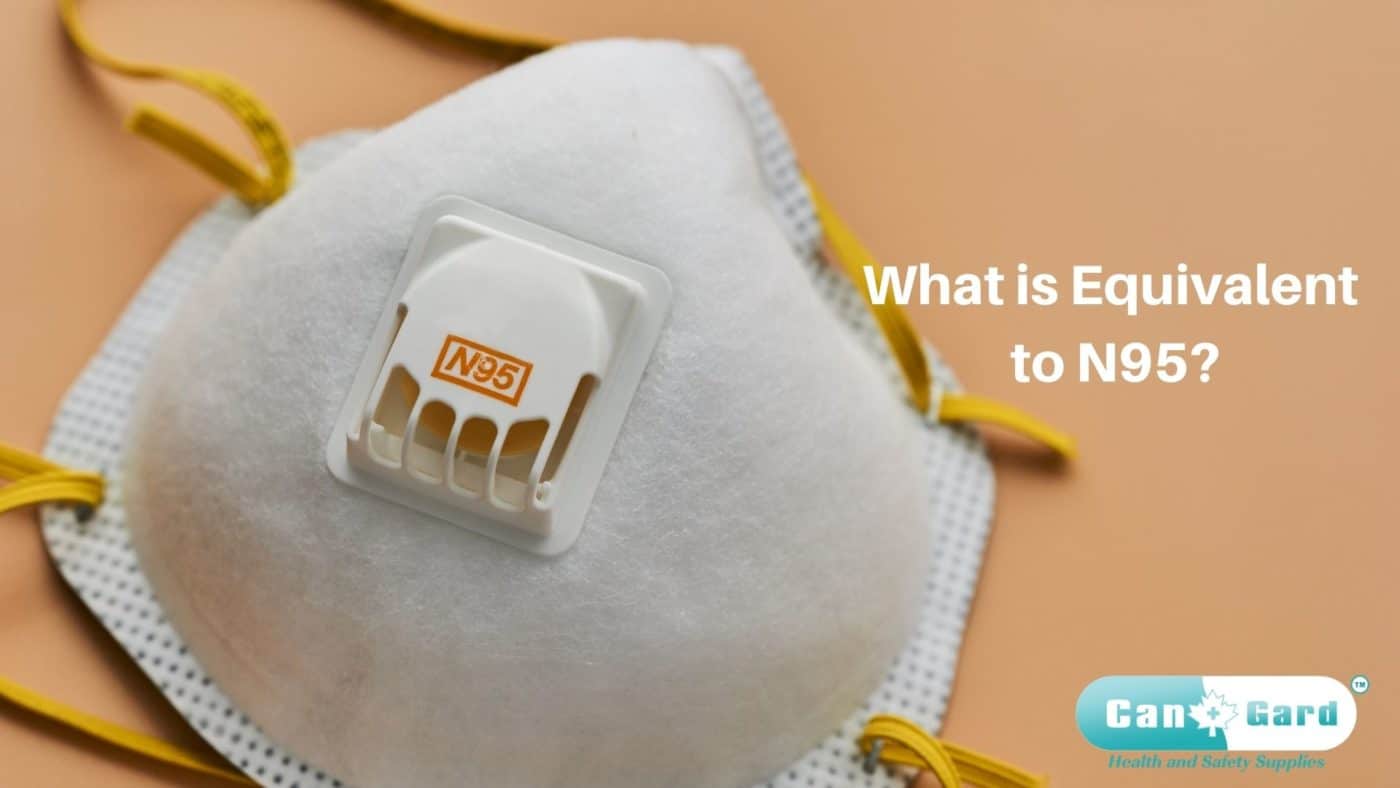Face Masks
What Masks are Equivalent to N95? CanGard Answers
The N95 mask is a popular medical-grade face covering that can help stop the spread of infectious diseases. But when demand is high, they can be hard to come by. Here we discuss masks that are equivalent to N95 respirators.
Mask Basics: Personal Protective Equipment
Personal Protective Equipment, or PPE, is worn to minimize exposure to hazardous materials or chemicals that can cause work-related injuries or illness. To ensure their employee’s overall safety, the employer must conduct a hazard assessment to determine the correct type of PPE to be used – depending on how hazardous the workplace environment is.
The Personal Protective Equipment used are mostly helmets, gloves, face shields, facemasks, respirators, goggles, or any equipment designed to protect the users from exposure to any harmful or infectious diseases and to prevent any types of injuries.
What is an N95 Respirator?
N95 is an example of personal protective equipment that protects the wearer from any airborne particles and airborne diseases. It is regulated by the National Institute for Occupational Safety and Health (NIOSH). The N95 respirators are a respiratory protective device designed to have a very close facial fit to filter any airborne particles efficiently.
This mask is a particulate-filtering facepiece that can filter out at least 95 percent of airborne diseases. It uses a mechanical filter respirator to protect particles efficiently but does not necessarily protect the wearers from gases or vapours.
Preventive measures are still to be taken by the consumers of this mask because there are inauthentic N95 masks widely spread in the market. These masks are often sold at a meagre price, encouraging consumers to buy for them instead. Consumers should make sure that the N95 they are purchasing has the “NIOSH” text or logo and a TC-approved number. Authentic N95 mask dramatically differs in their filtering process from the fake one. Thus, to ensure high quality of protection, you should avoid purchasing fake N95 masks and check out these masks that are equivalent to N95 instead.
Masks That are Equivalent to N95
Although many fake N95 masks are scattered around the market, there are also masks equivalent to the N95 respirator mask. Here are a few that are equivalent to N95 masks or even better.
N99, N100
The N-Series masks, comprising the N95, N99, and N100, are non-oil-resistant filters primarily used in the United States and Canada. The N95 filters a minimum of 95% of airborne particles, the N99 captures at least 99%, and the N100, equivalent to a HEPA filter, filters at least 99.97%. These masks are designed to provide protection against airborne contaminants without oil resistance.
R95, R99, R100
The R-Series, including the R95, R99, and R100 masks, are designed to be oil-resistant. The R95 mask filters at least 95% of airborne particles while also resisting oil, the R99 captures at least 99%, and the R100 offers a filtration efficiency of 99.97%. These masks provide both filtration and oil resistance, making them versatile for varied environments.
CN95
The CN95 is Canada’s response to the need for high-quality respiratory protection. It mirrors the U.S. N95 standard in terms of filtration efficiency, ensuring at least 95% of airborne particles are filtered out. Designed to meet the specific needs and standards of the Canadian market, the CN95 offers reliable protection against airborne contaminants in various settings. Like the N95, it provides protection without being oil-resistant.
CSA Z94.4-18
The CSA Z94.4-18 is a standard set by the Canadian Standards Association, ensuring that workers in Canada use respirators that meet rigorous performance and fit criteria. This standard underscores the importance of protection and fit, ensuring that Canadian workers are equipped with top-tier respiratory protection in various occupational settings.
PM 2.5 Dust Mask
PM 2.5 dust mask uses a PM 2.5 filter. This kind of filter improves a mask’s filtration effectivity and is usually used to protect the wearer from the smallest airborne particles. PM 2.5 filters used with a fitted cover will have the ability to block the broad majority of different airborne particles, such as fine aerosols.
This type of mask, like the N95 L-188, provides you with 95 percent filtration from non-oily particles, pollens, allergens, pet hairs, smoke, mites, leaves, moulds, and mould spores. This PM 2.5 dust mask also complies with the GB2626-2006 standards. This mask is made up of a non-woven fibre outer layer designed to protect the users from the outside particles that cause different respiratory sicknesses and the like.
PM 2.5 Filtration Process
The filter used in the PM 2.5 Dust Mask uses electrostatic barriers to capture different microscopic particles that typical face masks, such as masks that use fabric, cotton, and polyester, cannot. This type of filter also provides superior sub-micron filtration but with somehow less inhalation resistance than most medical-grade respirators like the N95 respirator. This type of filtration is not present in any typical cloth masks.
This type of mask is effective because:
- The PM 2.5 filter used in this face mask is made from the same advanced material used in medical-grade respirators like the N95 and the KN95.
- PM 2.5 filter uses both mechanical and electrostatic barriers that are capable of blocking the very smallest nanoparticle. If this type of filter is used with a fitted face mask, it will provide a high degree of filtration from particles in the air.
- Aside from the high degree of filtration, it gives when paired with a fitted face mask, it does not necessarily strain your heart because it is designed to allow a smooth breathing process for the user.
- The protection that this filter gives is convenient. This type of filter is flat, so it does not take up a lot of storage, and they take up little hold than the different respirators that are very bulky and hard to store.
- They retain effectiveness for years. Users can use PM 2.5 dust masks continuously for at least 16-24 hours (around 1 – 2 weeks of occasional use). Whenever it becomes harder to breathe, a user can just manually replace it with a new one.
- The result in laboratory testing discovered that a cotton mask with a PM 2.5 filter could achieve protection just a few percentage points less than the N95 and the KN95.
Buy Masks Equivalent to N95 at CanGard Today
Shop our extensive collection of face respirators and masks equivalent to N95 and beyond right here on our website.
Article Updated 2024-07-31

